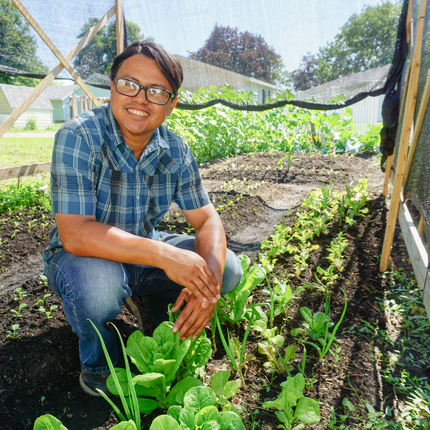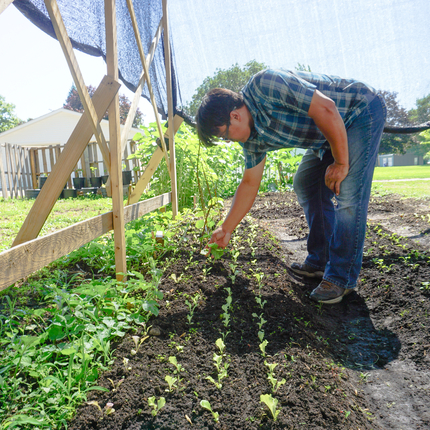Carmen Montes contributed to this blog. Para la versión en español, oprima aquí.
Sandro Lopes feels the most important thing people can do when farming is to care for the soil and environment.
Originally from Brazil, Sandro now lives and farms in David City, Nebraska. His speciality is growing microgreens, and he enjoys sharing his methods with others so they can try their hand at growing their own crops.
The farmer uses two production systems to grow plants for Huertos Regenerativos Na Terra, a project he’s working on through his microgreen vegetable business. Huertos Regenerativos Na Terra was born out of concern for the environment and soil.
One system is set up under a canopy of trees, where Sandro tries to imitate what would be found in nature. In this system, light shines on plants for a minimum of five to six hours a day. The other production system is set up for full sun, and he uses techniques for production of regenerative agriculture, with the goal being the construction or reconstruction of the soil.
“We believe the soil is a living thing,” said Sandro. “We try to disturb the soil as little as possible so the plants have the opportunity to grow their roots deeper and stronger.”
Sandro has received assistance from the Center for Rural Affairs, including technical assistance and help creating a business plan. He has also been one of the Center’s farmer hosts for events, as well as participated in other Center-sponsored events.
“I believe the Center gave me the vision,” said Sandro. “The Center arrived at a moment in my life when I needed motivation. With the Center’s help, I had the opportunity to meet professionals in the area and exchange ideas with them.”
While Center staff assisted Sandro in setting up his operation, they also took a soil sample before he started planting in order to complete a soil analysis. He believes healthy food goes hand in hand with healthy soil.
“Taking care of the soil for me is taking care of life; things cannot be produced if the soil is not healthy and right,” he said. “The more biodiversity, the more microorganisms in the soil, the better conditions you have to produce different plants in the same space.”
To others looking to start their own operations, big or small, Sandro recommends they become familiar with the agricultural production calendar for their area, as well as learn what amount of light the plants need each day.
Management is different for each plant, but Sandro says the most important thing is for people to grow plants that bring them joy.
“I believe that a fundamental factor is to do what you love and what excites you the most,” he said. “I’m going to try to plant as much lettuce as I can because that’s what I’m passionate about; seeing it grow and develop and feed several families. And, it’s a short cycle because it only takes 45 to 50 days, so the food is on the table faster.”
Sandro is grateful for the networking opportunities and connections he has been able to make through the Center. He also feels the Center has been a driving force behind bringing the Latino community of David City together with the rest of the city.
“The Center is the bridge that will unite the Latino community with David City,” said Sandro. “It’s important for our community to have an institution that will take care of small businesses. That’s what it’s all about; how to take care of small agricultural businesses in a more sustainable way. I see that our Latino community has a connection to an institution that cares; cares for the soil, cares for the environment, cares for people, and cares for life.”
He strongly believes that everyone has a purpose in their life, and he feels his is to continue to grow food and to offer what he can to his neighbors when they are in need. In addition to producing food for himself, Sandro donates 70% of what he grows to the local food bank.
“For me, producing food is essential and sharing that food is a goal,” he said. “It’s beautiful to be in an environment where there are people from different countries, and they are discussing how to cultivate plants but also how to grow food and share it. For me, that’s the bottom line.”






